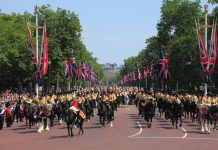Laurel & Hardy
Born at the turn of the 20th century, Englishman Stan Laurel established one of the greatest comedic double acts in living memory with his American partner-in-crime Oliver Hardy. They became well known during the late 1920s through the mid-1940s for their slapstick comedy with Laurel playing the clumsy friend of the pompous Hardy. Laurel had begun his career in music halls, and arrived in America on the same boat as Charlie Chaplin, eventually going on to direct and appear in Hollywood films. After sharing the screen with Oliver Hardy in 1927, the two became friends and their comic chemistry soon earned them their own films, and of course, their own signature theme music.
Charlie Chaplin
With a career spanning 75 years, Charlie Chaplin had his roots in working-class London, rising to become the leading star of the silent era, where his Tramp character had a hugely influential impact on American cinema. Characterised by pathos and slapstick, it was in parodying Adolf Hitler in The Great Dictator that Chaplin will be best remembered, his speech at the climax never failing to bring a tear to the eye.
https://www.youtube.com/watch?v=pK2WJd5bXFg
Tommy Cooper
Famed for his red fez and 6ft 4” stature, Welshman Tommy Cooper was a member of the Magic Circle and famed for his tricks that tended to go wrong. Born in Caerphilly, Glamorgan, South Wales, Cooper would serve with the Desert Rats in the Second World War, eventually creating his iconic magic-comedy act when borrowing a fez from a passing waiter in Cairo. Cooper went on to become one of the nation’s best-loved variety performers, mastering the art of irreverent one liners and cheeky pranks – it is said that when leaving a cab Cooper would pay the exact taxi fare before slipping something into the driver’s pocket saying, “Have a drink on me”. That something would turn out to be a tea bag.
Frankie Howerd
Best remembered as the toga-clad slave Lurcio in the sitcom Up Pompeii, the master of innuendo, Frankie Howerd was a hugely popular comedian both in his homeland and abroad. Born in York in 1917, Frankie moved to Eltham in Kent at the age of two – coincidentally the birthplace of another great comedian, Bob Hope. Painfully shy as a youngster, Frankie was drawn to comedy as away of overcoming his self-consciousness. Eventually overcoming this, he would begin his stand-up routines acts with his arm in a sling, telling his audience wryly: “The doctor said I can have it off in the morning!”
Spike Milligan
Born in India to Irish parents (and never actually in ownership of a British passport) Milligan spent most of his life in Britain, performing as a jazz trumpeter and vocalist before being called up to serve in the Second World War. Detailing his experiences in Adolf Hitler: My Part in His Downfall Milligan also penned popular children’s poetry, publishing Silly Verse for Kids in 1959. Of course it is for his pioneering radio programme The Goon Show for which he is best remembered, which is credited with having influenced the mighty Monty Python troupe.
Sid James and Kenneth Williams
The Carry On films are part of British comedy folklore, 31 low-budget British comedy motion pictures produced between 1958 and 1992 whose puns, capers and innuendoes won fans on both sides of the Atlantic. With a regular returning cast, the biggest names to be associated with the franchise were Sid James and Kenneth Williams. South African-born Sid James, a trained hairdresser, would eventually find fame working alongside Tony Hancock in his BBC Radio series Hancock’s Half Hour. He would appear in 19 Carry On films and has been described as the ‘grand old man of dirty laughter’. Meanwhile Kenneth Williams was a successful stand-up comedian and master of the double entendre, and appeared in more films that any other cast member. Despite the commercial success of the films, actors were poorly paid; Williams later wrote in his diaries the that he earned more in a British Gas advert than for any Carry On film.
Peter Cook and Dudley Moore
Leading lights of the British satire boom of the 1960, Peter Cook and Dudley Moore won plaudits for their absurdist comedy show Not Only… But Also. Cook was the son of a diplomat and initially intended to follow in his father’s footsteps before joining the famous Cambridge Footlights comedy troupe while at university. There Cook wrote for Kenneth Williams’ West End comedy revue before enjoying success in a satirical stage show Beyond the Fringe, which also featured Moore, Alan Bennett and Jonathan Miller (Cook famously impersonated the Prime Minister, Harold Macmillan at Edinburgh Festival). Moore, who was a successful performer in his own right prior to teaming up with Cook, became famous for ‘corpsing’; breaking character live on stage due to uncontrollably laughing, something Cook would actively seek to bring about.
Peter Sellers
One of the standout comedic actors of his generation, Peter Sellers has earned a place in many people’s hearts as the hapless Inspector Clouseau in The Pink Panther series. Born in Portsmouth in 1925, Sellers was a talented musician and impersonator and would often wow audiences with impressions of George Formby. Of course it was on The Goon Show with Spike Milligan and Harry Secombe that Sellers made his name, while years later performances in The Pink Panther and Dr Strangelove – with the famous line “You can’t fight in here. This is the War Room” – ensured his legend.
Morecambe & Wise
When you ask British people of a certain generation to name a comedy double act, the first name that comes to mind is often Morecambe and Wise. Their 43-year partnership began when they met at a Nottinghamshire revue show in 1941 and after the war the pair reunited to hone their comedy routines which would see them host their long-running Morecambe and Wise show which ran from 1968 to 1983. With Eric Morecambe playing the off-the-wall ridiculous role and Ernie Wise playing the disapproving straight man, the pair captured the hearts of millions, their biggest coup being to convince BBC Newsreader Angela Rippon to appear with them in a famous dance sketch in 1976.
Monty Python
The British surreal comedy group, whose television series Monty Python’s Flying Circus broadcast by the BBC from 1969 to 1974, was masterminded, written and performed by members Graham Chapman, John Cleese, Terry Gilliam, Eric Idle, Terry Jones, and Michael Palin. Predominantly former members of the Cambridge Footlights and the Oxford Revue, their influence over comedy was unprecedented – Margaret Thatcher famously quoted the dead parrot sketch at the 1990 Conservative Party conference. Successful films, stage shows and spin-offs followed including Spamalot, the popular musical based on Monty Python and the Holy Grail.






 © 2024
© 2024